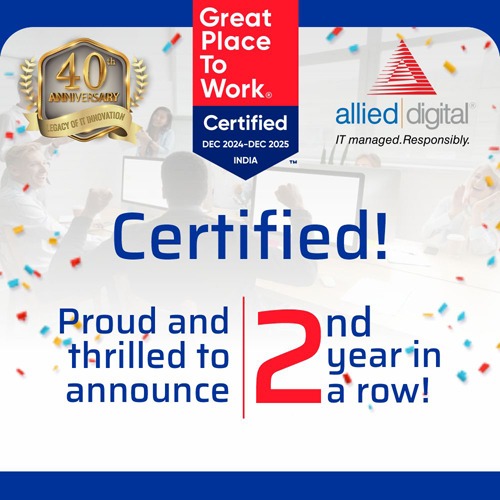We are a proud AWS Partner
Today’s modern IT environments with applications and workloads deployed across multiple cloud providers, private data centres, and edge locations, adding network complexity and increased risk.
Allied Digital Services Ltd provides the capabilities to support highly distributed multi-cloud environments that require reliable connectivity between multiple public IaaS and SaaS services and private clouds.
Allied Digital services enable businesses to access computing resources, such as servers, storage, databases, networking, software, and applications, without the need for on-premises infrastructure or management.
Cloud consulting services refer to professional services offered by Allied Digital to help businesses plan, implement, and manage their cloud computing strategies and infrastructure.
Assessing business needs and objectives to develop a comprehensive cloud strategy aligned with organizational goals. This may involve selecting the right cloud platform (public, private, or hybrid), determining migration strategies, and optimizing existing cloud deployments.
Assisting businesses in migrating applications, data, and infrastructure to the cloud.
Designing scalable, resilient, and cost-effective cloud architectures tailored to the specific requirements of the business.
Assessing security risks, implementing security controls, and ensuring compliance with industry regulations and standards in cloud environments.
Helping businesses optimize their cloud spending by identifying cost-saving opportunities, right-sizing resources, implementing cost management tools, and monitoring usage patterns to eliminate waste and maximize ROI.
Providing ongoing support and management services to ensure the smooth operation of cloud environments.
Offering training programs and workshops to upskill internal teams on cloud technologies, best practices, and tools.
Allied Digital key components of cloud enablement include:
Assessing business needs, goals, and requirements to develop a comprehensive cloud strategy aligned with organizational objectives. To identify workloads suitable for migration to the cloud, selecting appropriate cloud service models (IaaS, PaaS, SaaS), and determining the optimal cloud deployment model (public, private, hybrid).
Evaluating the organization's current infrastructure, applications, and processes to assess readiness for cloud adoption.
Developing migration plans and strategies to move applications, data, and workloads to the cloud efficiently and with minimal disruption to business operations.
Designing scalable, resilient, and cost-effective cloud architectures tailored to the organization's requirements.
Implementing robust security controls and compliance measures to protect data and applications in the cloud.
Providing training and education programs to upskill employees on cloud technologies, best practices, and tools.
Implementing tools and processes for managing and optimizing cloud environments, including monitoring performance, automating routine tasks, and optimizing resource utilization to improve efficiency and reliability.
Was this article helpful?
YesNo







Comments are closed.